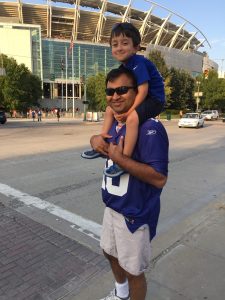
February 28 was declared Rare Disease Day by Kentucky’s governor to raise awareness for the many rare diseases experienced by one out of every 10 people.
One Kentuckian with a rare disease – seven-year-old Ethan Desai – is happily leading a pretty typical childhood, one that his parents weren’t sure was possible when they first learned of Ethan’s diagnosis in utero.
Ethan – an active second grader who is an avid reader, loves to play with his dog, and enjoys swimming, video games and Pokemon – has Osteogenesis Imperfecta. O.I., which is also called brittle bone disease, is a genetic disease that interferes with collagen production and results in frequent bone fractures, said his father, Dr. Neel Desai, a family physician with St. Elizabeth Physicians.
While Ethan was in utero, his parents were initially told their son’s disease was terminal – that his bones wouldn’t allow for him to walk or breathe.
Desai and his wife Debbie got a second opinion, formed a treatment plan and progressed with the pregnancy. Ever since that diagnosis, Ethan’s been defying those initial expectations.
Ethan has expanding stainless steel rods implanted in his legs and every three months he receives infusions of medication that strengthens his bones. He learned to walk with a walker at 14 months; at two, he was running. He averages one bone fracture per year.
Ethan avoids contact sports and he knows when to speak up at school or with friends when there is an activity he should avoid because his “special bones” could break, Desai said of his son.
“Because O.I. is so rare, medical professionals sometimes make assumptions that the person won’t live, breathe or walk,” Desai said. “But it’s a spectrum condition – for some people you would never know they have O.I. and then it can range to very severe or lethal. It’s one of those things that you can’t make an absolute proclamation.”
Some people with O.I. are in a wheelchair or are very short, but others can be typical height. Ethan is shorter than his peers, but he’s on the taller side compared to many other kids with O.I., Desai said.
“To any frightened parent, I say do not necessarily get too overwhelmed – there are kids and adults thriving out there,” Desai said.
Desai has become dedicated to helping educate other families dealing with an O.I. diagnosis. He’s helped launch a social media support group to exchange ideas among parents and he wrote an ebook that includes details about O.I. including patient and doctor experiences. Click here to watch a YouTube video explaining common O.I. myths, featuring Desai.

